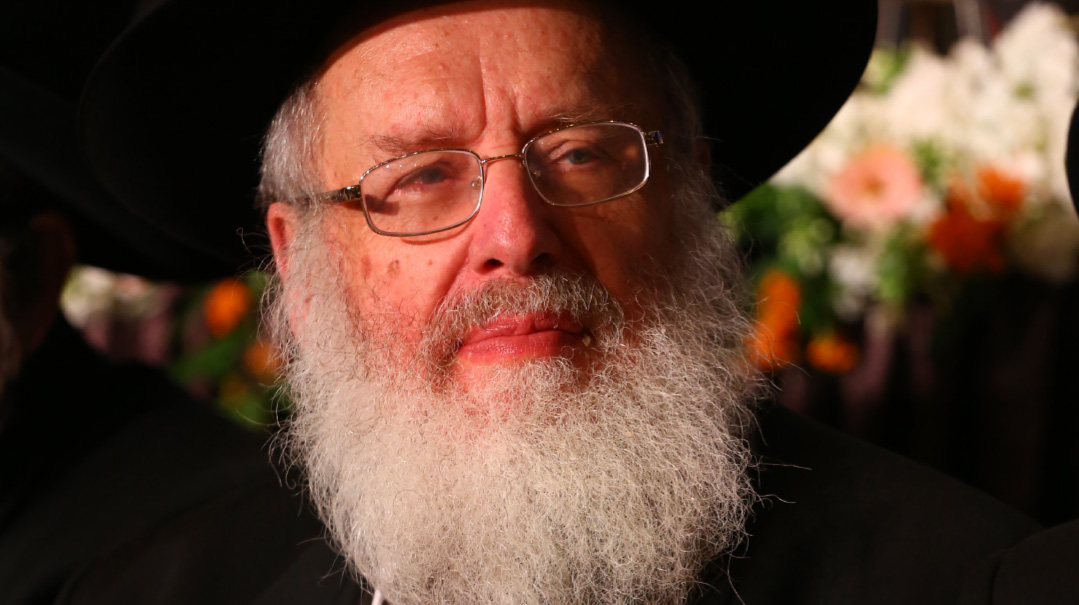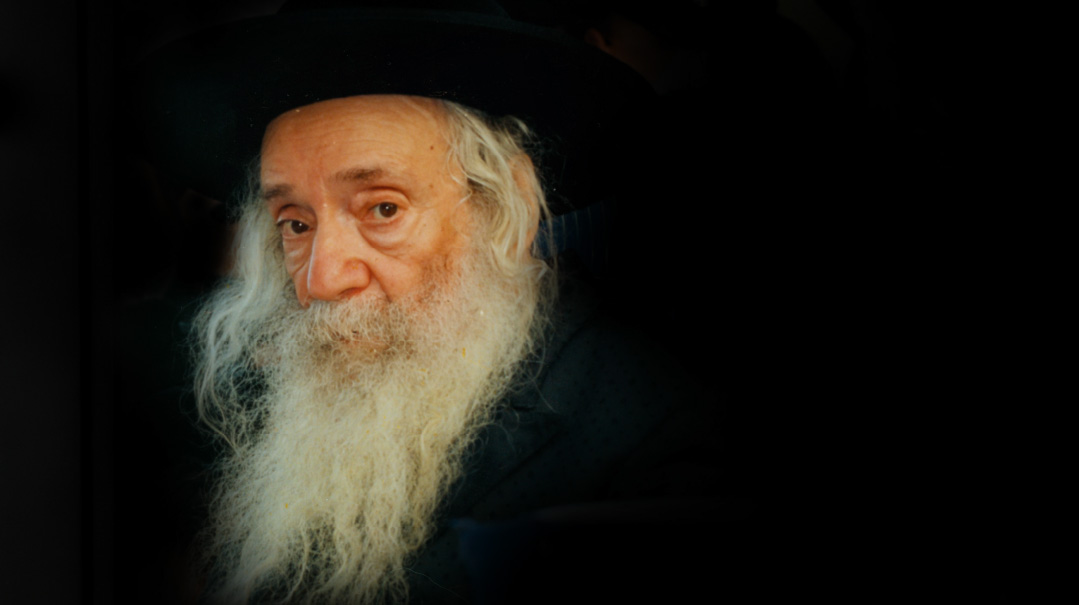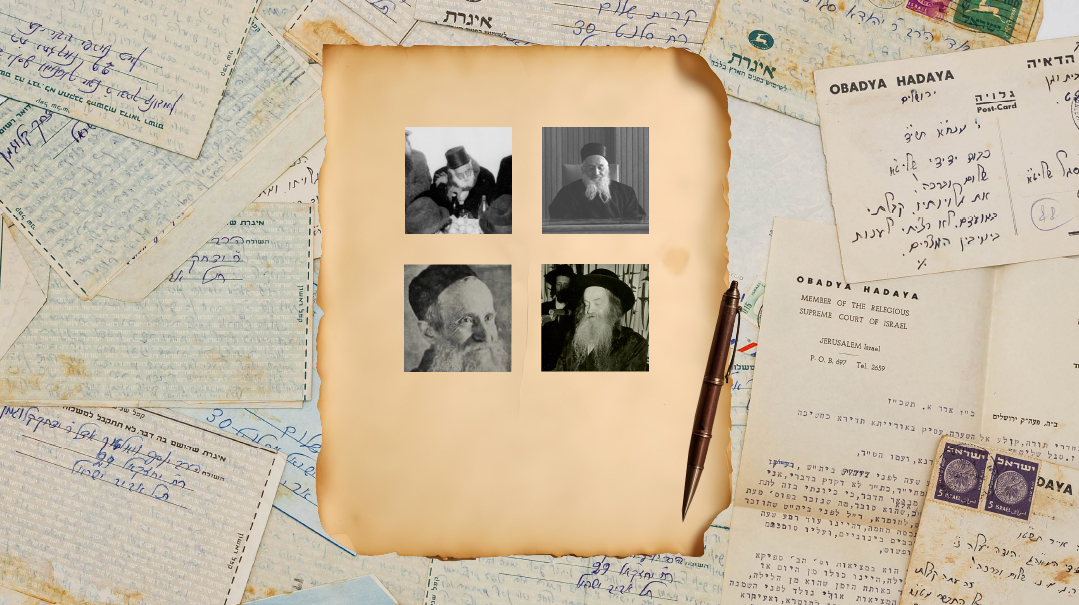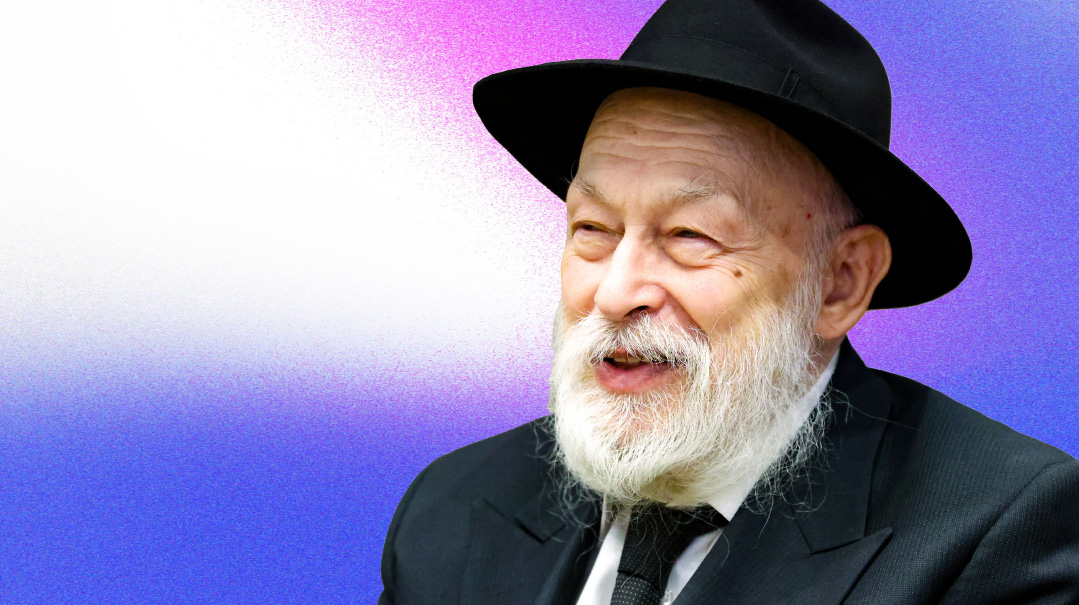The Story in the Music

A journey of discovery with music producer and bandleader Mendy Hershkowitz
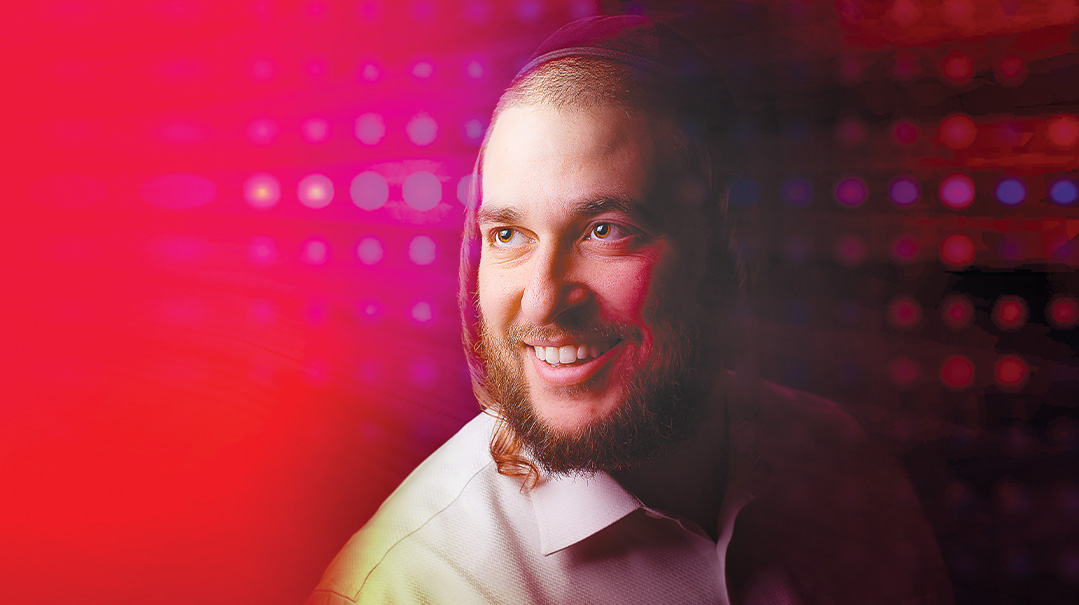
Photos: Naftoli Goldgrab, Yossi Goldgerger, Naftali Marasow
He’s the calm presence standing at the keyboard at weddings, upscale hotel concerts, or ambitious concert performances. He’s the brilliant musical mind pushing singers and musicians in new directions. He’s the recording mastermind who hears the subtle nuances of each instrument in a 60-piece orchestra. And he’s also the faithful Satmar chassid who hasn’t compromised or diluted his standards throughout his journey. You might call him an arranger, producer, band-leader or composer, but in his own mind, Mendy Hershkowitz is a kid from Monroe still discovering music
IT was sort of a big deal, the 2023 HASC concert. All HASC concerts are, but this year, it was a new concept, a new venue — the move to the New Jersey Performing Arts Center was a statement that this event was for people who took music seriously.
The crowd, wowed by the setting, layout and sound, did what good audiences do — buzzed with energy as the HASC anthem started up.
Then it happened. Not a big deal if you’re in the audience, but a pretty big deal if you’re onstage: a slight glitch in the sound system that had nothing to do with human error and everything to do with a wire and pole backstage.
Some people couldn’t take their eyes off the trying-not-to-panic singer, and others looked desperately for a technician, but my eyes were searching out bandleader Mendy Hershkowitz.
He was smiling. I knew it.
I knew, because I had seen that equanimity from up close.
About a year ago, I was asked to emcee a musical event dreamed up by my talented friend Yosef Chaim Aryeh. In trying to convey just how sophisticated an experience it would be, he told me that Mendy Hershkowitz would be leading the band.
At the time, I wasn’t that familiar with the name, but it sounded intriguing.
During that event, there was a mini-glitch — a performer segued into the high part instead of the low part, or maybe it was vice versa — not the sort of thing a random audience member would catch, but I was on the stage with an earpiece. I watched in horror as the music and the singer seemed headed on a collision course.
Mendy was standing behind his two-tiered keyboard, his smile growing as he spoke in the tiny mic snaking around his jaw. “Okay,” he told his musicians gently, “one more time the low part, you got this.”
It took a few painful seconds, the band playing through the mistake without getting flustered, and then quickly, happily meeting up with the singer and continuing the song.
All good.
Later on, I asked Mendy about it.
“Obviously, the glitches are going to happen here and there, no matter how much you practice,” he told me. “When it happens, the singer is extremely vulnerable. I’ve seen, over the years, how a performer who has a mess-up can wilt after that, and they dial it in for the rest of the night. I realized that even if they can’t hide, I can — I’m not the one out facing the crowd, he is — so I will try to support him.”
The first thing Mendy does in that case is to smile. “Then I tell him that we have his back, we’ll fix it. And sometimes,” he says, “if you stay focused, you can even take that mess up and turn it into music.”
He remembers a time when a trumpet player burst out with a solo in the wrong place. “It didn’t fit with the arrangement, but he was playing with such conviction, such force, that I told him to keep going. Just because it wasn’t planned, that doesn’t mean it’s not great music. It was beautiful.”
Even if you’re the sort of reader who wants your music article to be about music and not metaphors for real life, this one is too good. This is the whole zach in life, turning mistakes into music, is it not?
I’ve heard people answer “I’m still figuring out,” when asked what they do. It usually sounds, at least to me, like fake humility, like “Ha, ha, I’m so big and famous, isn’t it obvious what I do?”
When Mendy Hershkowitz shrugs and says it, though, it somehow fits.
Others would call him an arranger, producer, bandleader or composer, but in his own mind, he’s a kid from Monroe still discovering music.
Good music, someone once said, should ride the wave between unpredictable and predictable, giving both tension and comfort. Much the same way, Mendy’s story has elements of the predictable — he didn’t love school and found happiness in music — along with the unexpected. As a kid growing up in the Satmar shtetl, he loved learning (and he still loves learning). He wasn’t jumpy, wasn’t wild, wasn’t disruptive and was never misunderstood. Music wasn’t an escape and he wasn’t looking to escape. He didn’t run to it; rather, it came for him and never let go.
“I look back now and realize that my parents were really ahead of their time, they just understood that my relationship with music was unusual.”
When Mendy was 16 years old, Reb Yechezkel Hershkowitz made arrangements for his son to learn privately with two chavrusas, morning and afternoon. “I learned well with them, and the rest of my time was for music.”
Doing what with music? Playing? Listening? Writing?
“Discovering.”
In their Monroe home, the Hershkowitz family had some music.
“I remember being enamored with Mona Rosenblum, the sound that he was creating, and I spent a lot of time listening to his work. I recently told him about it, but it’s clear that he has no clue what he did for Jewish music.”
(When he says this, I wonder, Do you, Mendy? Do you realize how people talk about you, how singers thrill at the idea of being part of your shows, how much self-esteem you’ve given an industry?)
At night, when the house was quiet, the bochur also discovered jazz and classical music, complex combinations of sound that went deeper than words, a new language that flowed through his veins.
And he wanted not just to understand that language, but to speak it as well.
He had experimented with many instruments, but the one that he felt could best express the language in which he dreamed was the piano. “The saxophone can bend a note, and the clarinet can laugh, but only a piano can convey the full range and emotion of a piece. In the piano, I can hear all the other instruments.”
He started to go to recitals and concerts, silently listening, listening, listening until the music filled him.
“There is a pianist named Michel Camilo, one of the best, and I would go hear him.”
I close my eyes for a moment and imagine a slim Monroe teenager in the corner of a New York City jazz hall.
“White shirt, peyos down,” he says, a touch of pride in his voice. “I came with a friend or two and spoke to no one. I just listened to what was possible. And I learned,” he says quietly, “that everything is possible.”
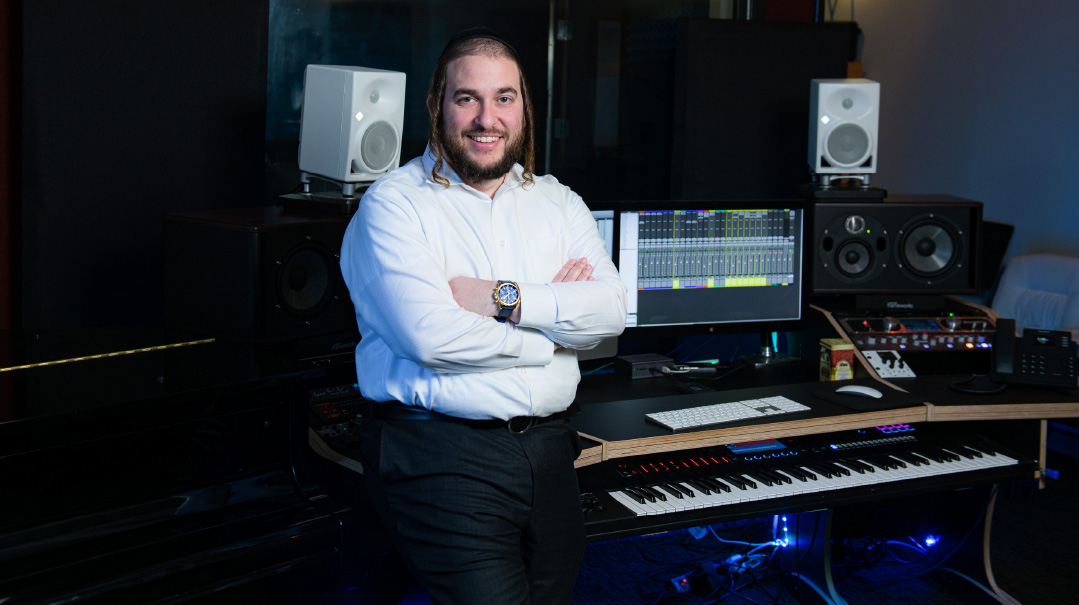
IN
Westchester, Mendy discovered Marty Laskin, who taught him music theory.
“Every language has its foundation, with words that represent different things. If you don’t get the foundation of the language, even if you know many words, you will never really be able to communicate, and music is no different.”
Paradoxically, along with the rules, he learned that there are no rules. “Music isn’t only math or science, and it doesn’t always work with a formula. If emotion isn’t driving you, you won’t be able to play for very long.”
Sometimes, he points out, a song is composed, and a few years later, another artist or group will add a harmony or interpretation that the original composer never thought of. “It’s his song, but it’s really not, because the song is just part of the music, and that personal expression and emotion is the other part, and that second part is always changing.”
By day, he was learning with chavrusas, and by night, he was hanging around with gray-haired academics in sweaters learning about scales, consonance and tonal systems.
“And writing. I was trying to write as much music as I could during those years.”
At some point his parents allowed him to start playing in public. He quickly learned that performing is not about showing what you can do, but about reading a room and bonding to the listeners.
“I would play for different organizations, trying to translate what I was learning into real life, using the music to connect with people, to sort of speak to an audience through the music, to react to their moods.”
He started to travel as well, and the circuit became a source not just of work, but of inspiration.
“We played at many events and there were usually speakers. I soaked in these derashos, hearing ideas that resonated. I was just the music guy, taking a break during the speech, so no one even noticed that I was frozen, mesmerized by what I was hearing.”
The performances gave him the opportunity to discover not just new ideas, but also new communities. “The Sephardic community blew me away with their respect for rabbanim and their passion for their mosdos. I loved the atmosphere. And I loved the spirit of Chabad events.”
He remembers that in order to travel across the border to Montreal for a gig with Lipa Schmeltzer, he needed a letter from his parents — because he was not yet a legal adult. “I wasn’t even 18 yet, but I was playing many nights and loving it.”
One night, he played a very upscale event, and the party planner wasn’t thrilled by his look. She approached the young pianist and asked if, out of respect to the hosts, he could hide his peyos please.
He shook his head slowly. He couldn’t. “You hired me to play, and these,” he told her as he reached for his peyos, “these are me.”
Life was good, but his parents thought he should get married. He wasn’t sure if the timing was right.
He was playing at a wedding in Ateres Chaya one night, when a young girl named Perry Gross showed up. At the shadchan’s advice, she stood on the woman’s side, watching him play.
“We met the next day, and it was pleasant. I told her my hopes, she told me hers, and we felt comfortable.”
With marriage came the next frontier: Mendy teamed up with Avrumy Schreiber to start the Freilach Orchestra. Singer Yidi Bialostozky describes the effect of that decision. “I remember when it started, a guy from Monroe with a band of his own. This wasn’t a baal teshuvah with classical music training, this was a kid with long peyos — and yet from day one, he was elevating the sound, clearly aiming for something higher.”
It took a bit of time, a slow 2007 giving way to a busier 2008. Once people tasted Freilach’s brand of music, they wanted more, and by 2010 there were calls to do it bigger as music became not just a sideshow at simchahs and events, but the main draw.
But as the band’s appeal grew, Mendy realized that he needed a change: He wanted more studio work and opportunities to customize experiences, and so the two partners parted ways in 2014.
“My uncle Lipa Feldman and I discussed how to move to the next level musically, finding musicians who bought into what we were trying to create,” Mendy says.
I am trying to understand what he was looking for: Isn’t playing an instrument enough to be in a band? Was there some sort of philosophical prerequisite to join?
“Well, yes, for sure you need to be able to play,” he explains, “but I wanted musicians who are all in, who give it their all.”
An early goal was to not just entertain or enliven chasunahs, but to create a full musical experience. You’ve noticed, perhaps, how in recent years, younger people don’t just sit around when music is playing but, in many cases, they are quietly listening, or even singing along?
That’s part of the Mendy Hershkowitz effect.
“This was new, for frum chasunahs, but when the music is reaching a person, that singing or humming happens by itself. I wanted musicians who would enjoy the challenge of reaching people that way.”
Mendy credits Sheya Mendlowitz with giving the new band its name. “Sheya has a unique eye for where Jewish music is headed and he encouraged me to start my own band, also suggesting the name, Sababa.”
The concept was great, but there was a copyright issue with the name and the next step was, in retrospect, the destination to which he had been headed all along.
In 2017, the Mendy Hershkowitz Band was formed.
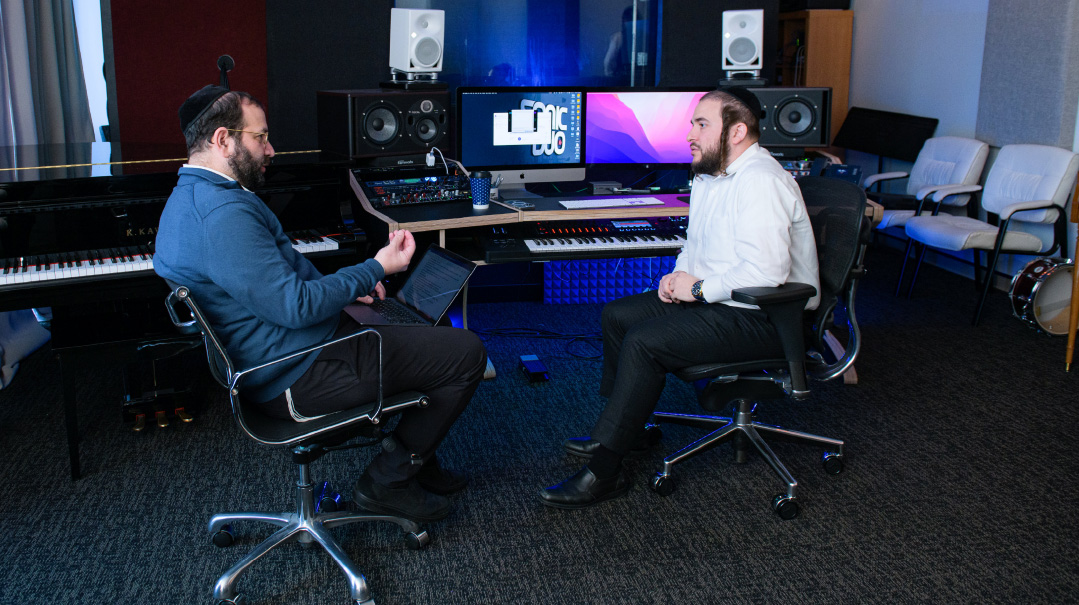
I wondered, isn’t playing an instrument enough to be in a band? For Mendy Hershkowitz, it’s about aiming for something higher
“M
endy is a person of firsts,” says Benny Friedman. “There is this inner restlessness that drives him. He was the one of the first people to have the idea of a Jewish music streaming site. He was the first to create a site where you can download Jewish sheet music.”
And along with producing a new generation of singers, including Yidi Bialostozky, Moshe Tischler, and Motty Ilowitz, there are those who give him credit for another singer as well: Mordechai Ben David.
The iconic singer of the 70s, 80s and 90s found a new burst of relevance in recent years, and it wasn’t a coincidence that when people called to book Mordche, it was recommended that they book Mendy Hershkowitz along with him.
“I don’t know if I get the credit,” Mendy cautions, “but I know that I worked with him on his live appearances to make sure that every part of his gift was being shared.”
There was a concert at which Mordche was scheduled to sing some of his hits, and the playlist was fairly predictable.
“No,” Mendy told him, “we’re not just singing “Vehochen,” “Anovim,” and “Moriah,” and then capping it off with “Someday.” We’re doing it differently.”
The singer asked what he had in mind.
“When you come out, I want your first song to be Memories.”
“Memories?” asked Mordche in surprise.
Mendy nodded slowly, firmly. “Yes.”
Now, sitting in his studio, surrounded by keyboards, computers, speakers and piles of sheet music, Mendy remembers that night.
“Look, he wrote those lyrics himself after his mother passed away, singing in tribute to her. What do you think happened when he came on stage and started singing it?”
Tangled up in memories, years flown by,
Remembering the words you used to say,
Who would ever think we’d have to say goodbye,
And face that final day.
The audience felt a surge of emotion, of longing for what was, not just an artist but a child trying to grasp the serenity and clarity of a different time.
The applause was thunderous, but what made the night a success to its producer, was Mordche coming over to Mendy right after and saying, “Thank you. Thank you.”
Still, with all the gigs, upscale chasunahs, and events, there was something else Mendy wanted. His face is tinged with wistfulness as he remembers one Chol Hamoed performance at a KMR retreat featuring Benny Friedman.
“It was a nice show, but it’s hard to engage the audience at a program. Music isn’t the main or only thing there — there’s great food, entire families. You know, people are distracted.”
The show ended and the crowd and performers filed out of the hall. There was a piano in the lobby and Mendy casually sat down by himself and started to play. Benny came over to sing, the two of them enjoying the moment — but only for a moment, because a small crowd gathered around them, and then the crowd got bigger.
The music was alive, the crowd huddled around the piano, singing with their eyes closed, and Mendy looked up for a minute. Why, he asked himself, can’t every concert have this feel?
“An event is a moment, and its success depends on many outside factors. The Ribbono shel Olam decides what the weather will be, what sort of mood people will be in, if the food is good, right? But once the people are actually there, the goal is to make them forget that they ended up in a lousy parking spot and that they don’t love the main course, or whatever it is. The music should be able to deliver for them.”
That thought percolated for a while, until one Succos when he felt the magic again. “I was sitting in a succah one night, in Williamsburg, just singing with people,” he remembers. “Some had good voices, some didn’t, but everyone was into it. No one was schmoozing or even looking at their phones, they were letting the music take them somewhere. And I wanted to see that happen in a larger, more formal setting, too.”
Shirim V’shiurim was his ensuing attempt to recapture the magic of the post-concert kumzitz and the singing in the succah. “I didn’t come up with the idea,” he clarifies, “but I was a fan of the concept and happy to try.” The Shirim V’shiurim events, he explains, are not a performance and the audience is not meant to partake passively of music delivered by professionals onstage.
These innovative Chol Hamoed events are held in a Brooklyn theater, with an orchestra and choir. The songs are classics and the orchestrations are designed to showcase the layers of complexity and emotion in each one. The goal is to connect and engage in a way unlike any concert — to get the audience actively involved in creating the musical experience. “We don’t play while the people enjoy. We play and the people sing, really sing.”
And though it’s not simple to enforce rules in a large theater, there is a ban on cell phones. “We don’t want people to sit here and be somewhere else. The musicians are standing on stage, but we’re just a band, while the audience are the real performers.”
One of the events saw a special guest there too: “I persuaded my father to come, he’s not the concert-going type, but I wanted him to understand what he invested in all those years ago, when he pushed me in this direction. He was just amazed. That meant a lot to me.”
By all accounts, Mendy is a perfectionist, yet when you speak to musicians and singers who work with him, the first thing they comment on is his calm.
“When I go up to sing and I see Mendy’s there, I immediately feel this tranquility,” says singer Shea Berko, “and it makes my singing better too. He is far more than a calming presence.”
Not just Shea, who is a newcomer next to Avraham Fried.
“His calm demeanor before the biggest shows is just what performers cherish,” Avremel says, “and his smile melts away butterflies.”
(Yes, of course I asked it — “You, Avraham Fried, still get butterflies?” “Yes,” he replies, “colorful ones, it’s just that performers with experience learn not to let the audience know that.”)
Isn’t Mendy’s meticulousness a contradiction to his famous aura of calm? Someone who cares about every detail, every nuance, doesn’t seem likely to stay unruffled when things go wrong.
Mendy explains: “Actually, calm brings out the best in people. Musicians are talented people, and if everything is well organized when they show up, they appreciate it.”
A seasoned violinist is awed by Mendy’s ear. “If a single instrument in a sixty-piece orchestra is playing a wrong note, he will pick it up,” he says. “But musicians prefer that, they like being held to a high standard.”
Another thing musicians appreciate is innovation. “They don’t want routine, the same lines and chords night after night,” Mendy says. “A musician has to be able to transition based on where the audience is at on that night. We are fortunate not just in our musicians, but in our whole team — my uncle Lipa, the chevreh at the office, the PR team — every one of them is part of the story I get to tell.”
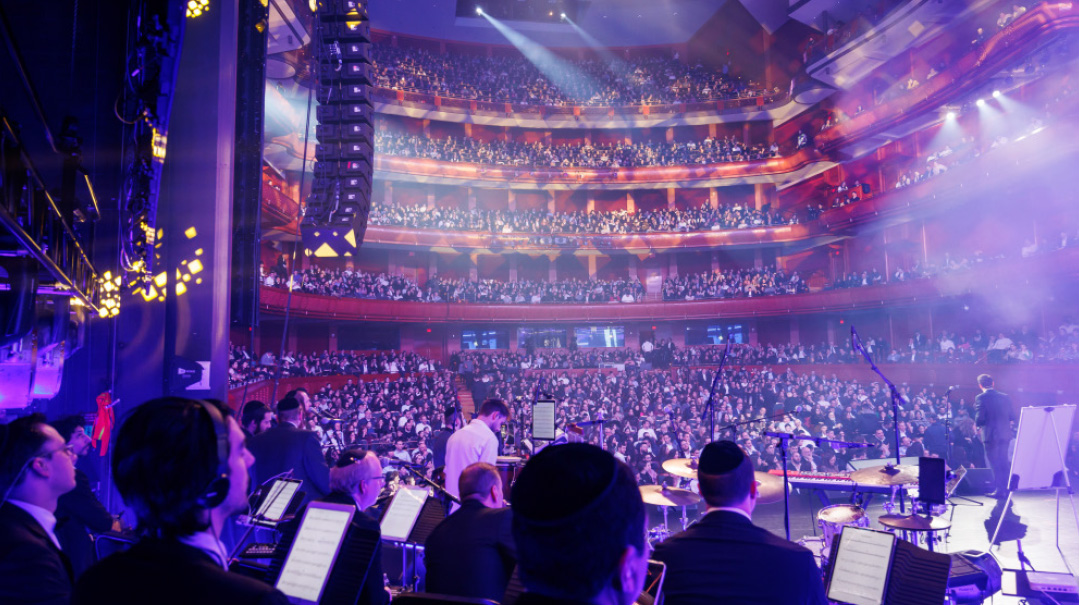
Mendy speaks to the audience through the music, gauging and reacting to their mood and headspace. He’s always been meticulous, but is also totally calm, which he says “brings out the best in everyone”
“Y
ou can gauge the confidence of a bandleader by how he counts in during the arrangement, the 1, 2, 3, 4,” says Avrumi Berko, himself a celebrated bandleader. “As many times as I’ve watched Mendy do it, I’m still inspired by his confidence, the way he leads his team into the set.”
“You can see it in Mendy’s eyes,” says Shmueli Ungar, “They’re very expressive when he’s up there, and he’s leading us all night long that way.”
Mendy laughs when I mention the eyes. “It’s a problem,” he says, “because eyes that can motivate can also deflate, so I’m working on hiding my reactions a bit better. If a musician is scared to veer from the script, we have a problem. I want to convey to them that if you don’t sometimes mess up, then you’re not trying.”
When you’re seeing Mendy on stage, says event producer Shlome Steinmetz of the Pivot Group, you’re not just seeing a musician. “Mendy is a storyteller, and the music is his means to tell it.”
The personal aspect shows itself in another way as well. “Leading the HASC concert might be considered a career achievement,” reflects Rabbi Judah Mischel, executive director of Camp HASC, “but when it comes to Mendy Hershkowitz, there’s a backstory there. Every summer we have Experience Day in camp, when we open the grounds to families and friends of our campers, and the music is a big part of it. Last summer, Mendy came with his orchestra to play and when it came time for the bill, he could barely even speak. ‘Thanks for letting me be part of this kiddush Hashem,’ he said, and waved away the suggestion of payment. That story also comes through in the music.”
In many ways, Mendy Hershkowitz remains the same kid from Monroe as the one who took his first steps in the music world 20 years ago.
“He has played with Ribo and Akiva, with MBD and Fried, he’s done the white tuxedo thing, but the peyos are the same as they always were,” says Yidi Bialostozky. “Not the peyos as a branding tool, but as part of his essence, he’s a varmeh Satmareh yungerman and it’s clear.”
While I was working on this piece, Mendy happened to be raising funds for his son’s cheder. The nature of these online campaigns is that they become sort of a flex for the raiser, a chance to show who donates to his page and to showcase his alliances with the rich and famous.
Mendy is, for lack of a better term, “chal” in that realm, and I was looking at his online thank-you’s to donors with a bit of curiosity. His responses were understated to the point of being boring, none of the breathless, “you’re a LEGEND, an honor to share the stage, what a voice,” but a steady, courteous stream of “thank you for your donations,” conveying the same respect to both the $18 guys and $500 guys, sans name-drops or inside jokes.
Mendy’s chavrusa Shia Freund is like an uncle to the Hershkowitz children. “We learn every day. No matter what else is going in Mendy’s life, he shuts it all out. The guy who has almost every Jewish singer trying to reach him,” Shia remarks, “shuts it all out when he comes into his house. He’s a home run on real tzniyus and pashtus.”
Mendy accepts this last comment with a gracious nod. “Family is the most important thing to me, period, and I could not do the job I do if not for my wife, Perry. If I look calm up there on stage, it’s because of my family.”
Sonic Duo, Mendy’s musical headquarters, is housed in a fairly ordinary Monsey commercial building. Mendy goes to his office each morning like an accountant or podiatrist might, sitting down to write music for several hours and prepare for the evening’s gigs, but there is also a recording studio on site where many of the younger artists record their albums.
They want Mendy’s ear, Mendy’s attention to detail, and Mendy’s sense of how to reach the people.
“Maybe,” he says, “they come here not because they think I’m so brilliant, but because they know I believe in music and that helping them discover the music inside them is something I love to do.”
Shmueli Ungar feels that the studio and bandstand are two parts of the same story — and that fusion gives Mendy’s music some extra sparkle. “Not too many people have the live experience, night after night, and also see the backend, the process of constructing music piece by piece. When Mendy’s on stage, you hear the studio and, in his studio, you can feel the stage.”
Mendy shares a quote he saw in an interview with a secular artist: “You tell yourself ‘You’re the greatest, you’re the greatest, you’re the greatest,’ and then 15 seconds before you go on stage you go, ‘I don’t know… I don’t know,’ and then the lights come on and you go, ‘I know!’”
That’s the quote.
When you’re up there and the music starts, you should know. Any uncertainty or ambiguity about who you are should disappear with the opening strains of song.
Sitting with him, however, one gets a sense that Mendy Hershkowitz doesn’t lie in bed at night wondering who he is and what his legacy will be.
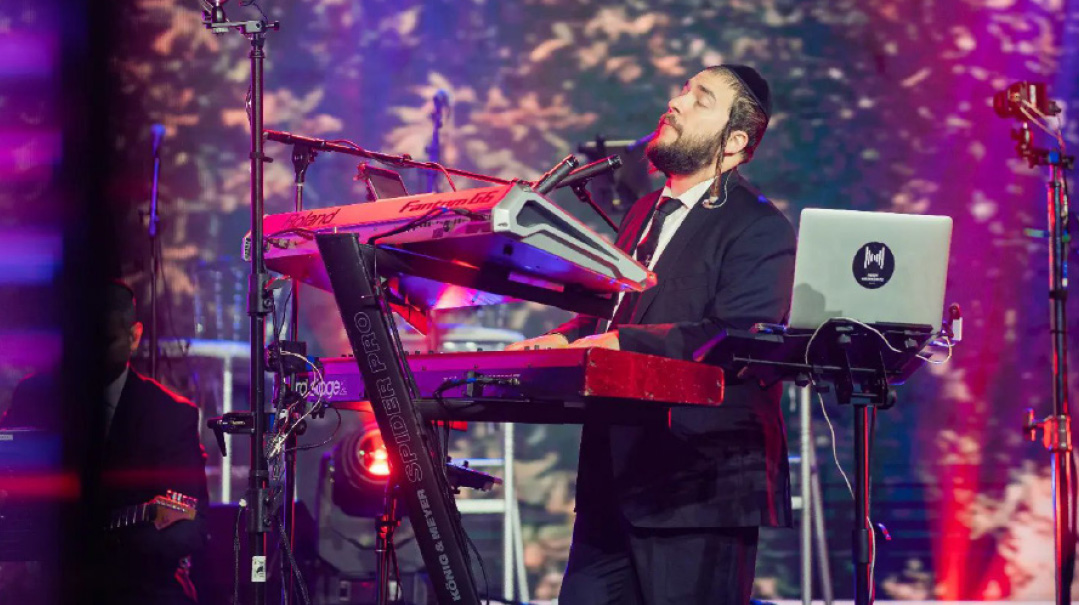
IT
was a crazy day, Benny Friedman remembers, before a major event. “It looked like every single person in the building was coming over to Mendy with their little requests, notes and advice — and he’s listening calmly, like he always does. I felt bad,” Benny recalls, “because I needed a key changed in one of the songs, different than we had done it in rehearsal, and I went over to tell him. He listened to me like he did to everyone else, and then nodded, completely unruffled.”
The day went on, minutes to showtime winding down. The doors opened, the audience started to file in, tension began building backstage. There was a moment of silence, the peace before the storm, and Benny watched Mendy leave his post and head to the corner to make a phone call.
He spoke quietly, calling home, and asking for his son. “Lummir lernen Mishnayos,” Mendy said, listening as his son reviewed the day’s learning with him. Then he wished the boy a good night, closed the phone, hid it away and went back up to his keyboard, back to tell a story.
(Originally featured in Mishpacha, Issue 951)
Oops! We could not locate your form.


